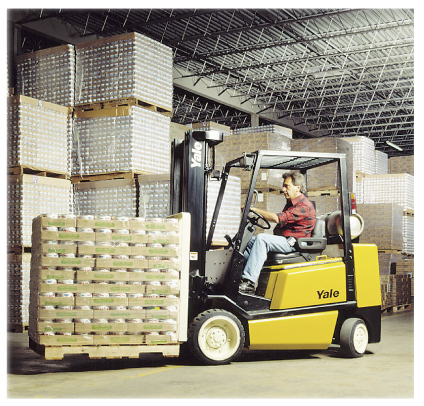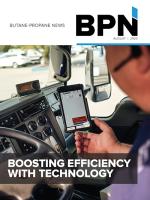Saturday, August 29, 2020
Concrete cutters, forklifts, and commercial lawn mowers are three opportunities for propane that will be promoted by the new director of off-road business development at the Propane Education & Research Council (PERC). Matt McDonald, who joined PERC in May 2020, will lead research and development and training projects with a focus on new product development and communication strategy and outreach. 
“I always have had an eye for opportunities for propane,” McDonald said. “An example would be large buildings going in where a lot of concrete is a major component in the building process. Propane is a perfect fuel for the process of cutting concrete in areas that are often enclosed. A fuel with very few emissions is best for the health of employees in this situation.”
A general manager at Ferrellgas for nearly six years, he also served as an aircrew survival equipment man in the United States Navy for four years. For McDonald, who was happy in his role at Ferrellgas, the description of the role at PERC just jumped out at him as something he absolutely wanted to do. “I am grateful for the opportunity to lead this market and excited for the new challenge. I know I am joining forces with an incredible team here at PERC and am eager to dive in and get started.”
“Matt’s passion for the industry, paired with his existing experience and expertise, made him a great fit for this position,” said PERC president and CEO Tucker Perkins. “We have no doubt he will be a great addition to the PERC team and look forward to watching him expand propane use in the off-road market in new, innovative ways.”
“Noticing opportunities for propane is key to Matt’s role,” said Cinch Munson, PERC’s senior vice president, business development. “He comes to us with a mindset already in place of looking for the many, many opportunities where propane can bring value in the off-road market. The machines and engines to cut concrete are one of many options where we can expand propane’s market share.”
FOCUS ON FORKLIFTS
“Matt joins us at a critical time,” Munson added. “Priorities for PERC in 2020 through 2022 in our strategic plan include a heavy focus on forklifts and material handling. We need to continue to innovate to be successful in this long-standing market.” He pointed to two key projects PERC is currently working on. “One is a retrofit exhaust treatment which lowers emissions on a forklift to nearly zero. Another is an ongoing project to create a hybrid forklift which runs on both electricity and propane. We continue to improve our case for propane with new engines and forklifts that fit evolving needs in the marketplace. We are cost-effective and environmentally friendly.”
Munson noted that material handling in warehouses, many of which have smaller and smaller aisles for moving around, demands smaller, nimbler machines to navigate the workspace. He feels that it is critical to have fewer emissions to keep those in the warehouse from breathing them in constantly.
“The hybrid forklift concept is very intriguing to many who use forklifts,” McDonald explained. “With electric batteries required to run forklifts often needing to charge, a propane system can be in place to keep the batteries charged while the forklift keeps running without stopping to recharge. The fueling of the forklift with propane requires very little time. It is designed to just pop an empty tank off and replace it with a full propane tank.” Size, length of shifts, and how the forklifts operate are key factors to the best type of forklift and best energy to utilize, according to McDonald and Munson.
“As propane engine technology has improved, new options for lifts include Class 7 lifts that have typically run on diesel fuel,” Munson said. “Propane engines with higher horsepower and higher torque make larger lifts running on propane possible.” He noted there are more waterborne cargo ships worldwide running on propane engines. “This market doesn’t affect U.S. domestic use as much as worldwide use since there are not a lot of cargo ships under the U.S. flag. Nonetheless, there are plenty of options for the large-scale engines to drive new markets.”
MORE GROWTH OPTIONS FOR PROPANE INDUSTRY
McDonald pointed out the propane lawn mower segment will be another segment PERC will continue to support although with less focus. “The propane industry captured a significant share of this market over the past decade,” he said. “City parks, state parks, and national parks all saw the value of a lower cost and environmentally friendly method for cutting grass across the country. While the growth has slowed more recently as motor gas prices have been lower, we will continue to make marketers aware of how to promote this market segment and all the details for selling and servicing. A commercial mower often uses as much propane in a year as a typical house.”
“Now, making the lens larger as we look for growth in the off-road market, there is a whole range of products in the marketplace to consider as growth options for propane,” Munson concluded. “We need to look no further than the rental yard for ideas for propane growth. There are various generators, the concrete cutters of all types, and many more products large and small that can be designed to run on a propane engine. We have a very clean and cost-effective fuel and we have much more to do to maximize its usage.” — Pat Thornton

“I always have had an eye for opportunities for propane,” McDonald said. “An example would be large buildings going in where a lot of concrete is a major component in the building process. Propane is a perfect fuel for the process of cutting concrete in areas that are often enclosed. A fuel with very few emissions is best for the health of employees in this situation.”
A general manager at Ferrellgas for nearly six years, he also served as an aircrew survival equipment man in the United States Navy for four years. For McDonald, who was happy in his role at Ferrellgas, the description of the role at PERC just jumped out at him as something he absolutely wanted to do. “I am grateful for the opportunity to lead this market and excited for the new challenge. I know I am joining forces with an incredible team here at PERC and am eager to dive in and get started.”
“Matt’s passion for the industry, paired with his existing experience and expertise, made him a great fit for this position,” said PERC president and CEO Tucker Perkins. “We have no doubt he will be a great addition to the PERC team and look forward to watching him expand propane use in the off-road market in new, innovative ways.”
“Noticing opportunities for propane is key to Matt’s role,” said Cinch Munson, PERC’s senior vice president, business development. “He comes to us with a mindset already in place of looking for the many, many opportunities where propane can bring value in the off-road market. The machines and engines to cut concrete are one of many options where we can expand propane’s market share.”
FOCUS ON FORKLIFTS
“Matt joins us at a critical time,” Munson added. “Priorities for PERC in 2020 through 2022 in our strategic plan include a heavy focus on forklifts and material handling. We need to continue to innovate to be successful in this long-standing market.” He pointed to two key projects PERC is currently working on. “One is a retrofit exhaust treatment which lowers emissions on a forklift to nearly zero. Another is an ongoing project to create a hybrid forklift which runs on both electricity and propane. We continue to improve our case for propane with new engines and forklifts that fit evolving needs in the marketplace. We are cost-effective and environmentally friendly.”

Munson noted that material handling in warehouses, many of which have smaller and smaller aisles for moving around, demands smaller, nimbler machines to navigate the workspace. He feels that it is critical to have fewer emissions to keep those in the warehouse from breathing them in constantly.
“The hybrid forklift concept is very intriguing to many who use forklifts,” McDonald explained. “With electric batteries required to run forklifts often needing to charge, a propane system can be in place to keep the batteries charged while the forklift keeps running without stopping to recharge. The fueling of the forklift with propane requires very little time. It is designed to just pop an empty tank off and replace it with a full propane tank.” Size, length of shifts, and how the forklifts operate are key factors to the best type of forklift and best energy to utilize, according to McDonald and Munson.
“As propane engine technology has improved, new options for lifts include Class 7 lifts that have typically run on diesel fuel,” Munson said. “Propane engines with higher horsepower and higher torque make larger lifts running on propane possible.” He noted there are more waterborne cargo ships worldwide running on propane engines. “This market doesn’t affect U.S. domestic use as much as worldwide use since there are not a lot of cargo ships under the U.S. flag. Nonetheless, there are plenty of options for the large-scale engines to drive new markets.”
MORE GROWTH OPTIONS FOR PROPANE INDUSTRY
McDonald pointed out the propane lawn mower segment will be another segment PERC will continue to support although with less focus. “The propane industry captured a significant share of this market over the past decade,” he said. “City parks, state parks, and national parks all saw the value of a lower cost and environmentally friendly method for cutting grass across the country. While the growth has slowed more recently as motor gas prices have been lower, we will continue to make marketers aware of how to promote this market segment and all the details for selling and servicing. A commercial mower often uses as much propane in a year as a typical house.”
“Now, making the lens larger as we look for growth in the off-road market, there is a whole range of products in the marketplace to consider as growth options for propane,” Munson concluded. “We need to look no further than the rental yard for ideas for propane growth. There are various generators, the concrete cutters of all types, and many more products large and small that can be designed to run on a propane engine. We have a very clean and cost-effective fuel and we have much more to do to maximize its usage.” — Pat Thornton


